According to multiple sources, Janet Jackson—who turns 50 next week—is pregnant with her first child. The news isn’t shocking given that the singer announced in a video on Facebook early last month that she was postponing the rest of her tour to start a family.
“Please if you can try and understand that it’s important that I do this now,” she said in the video. “I have to rest up, doctor’s orders, but I have not forgotten about you. I will continue the tour as soon as I possibly can.”
Jackson also announced on Twitter in late December that she would be halting her tour to have surgery, but offered no additional details. According to E!, Jackson is in her second trimester of pregnancy after working with a fertility specialist.
It’s difficult enough for a woman to get pregnant at practically any age—how is it possible for a woman who is just shy of 50 to do the same thing?
It’s “extremely rare” that it happens without reproductive assistance, fertility specialist Cynthia Austin, M.D., director of In Vitro Fertilization at the Cleveland Clinic, tells SELF, adding that a woman of Jackson’s age would typically either use a donor egg from another woman or use her own previously-frozen eggs. “It would be almost impossible for her to have any kind of fertility treatment that would have made her any more likely to get pregnant at 49,” she says.
It’s “extremely rare” that it happens without reproductive assistance, fertility specialist Cynthia Austin, M.D., director of In Vitro Fertilization at the Cleveland Clinic, tells SELF, adding that a woman of Jackson’s age would typically either use a donor egg from another woman or use her own previously-frozen eggs. “It would be almost impossible for her to have any kind of fertility treatment that would have made her any more likely to get pregnant at 49,” she says.
“As we get older, the percent of eggs resulting in embryos that can become babies is smaller and smaller,” Austin says. “At age 45, only about one out of every 10 women who was able to get pregnant on her own before is still able to get pregnant. Of those who do get pregnant, 50 percent will miscarry. Of those who don’t, 10 percent will have a pregnancy that is chromosomally abnormal. It’s not the woman, it’s her ovaries.”
More likely a woman that age wouldundergo in vitro fertilization (IVF), in which an egg is fertilized in the lab and the resulting embryo is transferred into her uterus.
A woman can use her own frozen eggs for IVF, but it’s recommended that she freeze them before age 35, David Diaz, M.D., reproductive endocrinologist and fertility expert at California’s Orange Coast Memorial Medical Center, tells SELF. Why? As a woman ages, more of her eggs contain chromosomal abnormalities, which can result in miscarriage or the baby having a serious condition like Down Syndrome or Turner Syndrome, he says.
Reproductive endocrinologist Elizabeth Kennard, M.D., division director of endocrinology and infertility at The Ohio State University Wexner Medical Center, tells SELF that a woman of Jackson’s age who gets pregnant these days most likely used a donor egg. “Egg freezing was not really available years ago for a 49-year-old to have previously frozen her eggs for use in the present,” she explains. (The practice of freezing one's eggs for future use is relatively new.) “I wouldn’t want the public to think that with enough money and medical care, an older person can be successful at achieving a pregnancy with her own eggs. That is not often the case.”
Austin calls the situation “very frustrating” for women who still feel very young in their late 40s and early 50s. “Ovaries still age the way they always did,” she says. “Even in your 30s, it’s a bigger challenge to get pregnant than in your 20s—the aging thing is important.”
Unfortunately, being pregnant at 50 isn’t without its health risks. Diaz says it comes with an increased risk of gestational diabetes, high blood pressure, stroke, and heart problems. And, since a woman’s blood circulation isn’t as good at age 50 as it was when she was younger, the baby’s growth could be stunted.
Despite the difficulty getting pregnant at a later age and the increased health risks, experts say it’s absolutely possible for women to have a healthy pregnancy at age 50—in fact, Diaz has had several patients in their 50s who have delivered healthy babies. “It’s hard to predict ahead of time whether a woman will have complications, but generally speaking, the healthier the woman, the more smooth the pregnancy will be,” he says.

